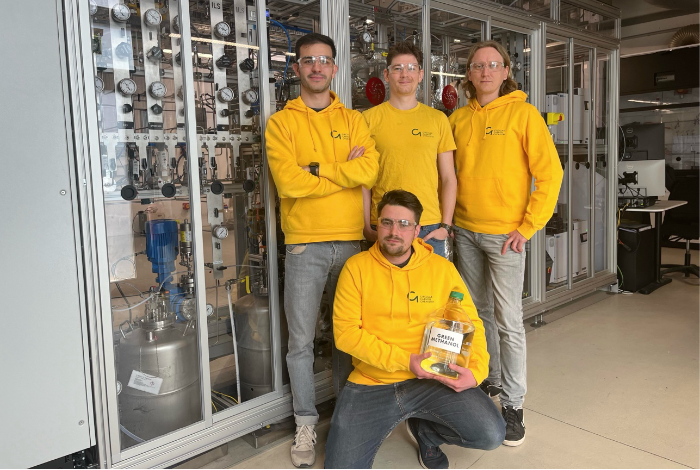
Climate tech start-up C1 just completed its first fully autonomous, fully continuous methanol production cycle at its “C1 alpha” miniplant in Berlin Adlershof. For the first time worldwide, the company has run a homogeneous methanol catalysis process continuously without operator intervention for a duration of 20 days on end. At mild conditions of 20 bar and 120° Celsius, “C1 alpha” has reached a single pass CO conversion of 95% with a selectivity of 95% – confirming the company’s early predictions from its advanced quantum-chemical simulations.
When compared to traditional methanol production, C1 now achieves a proven single pass efficiency that is about five times higher while temperature and pressure can be reduced by more than 50 percent. C1 hereby sets a new standard in green methanol production, proving the advantages of the patented C1 catalysis and the predictive power of quantum chemical simulation. The company has reached this important milestone less than one year after commissioning its first chemical reactor, effectively cutting the usual development time for a new catalyst from invention to commercial application from 15 years to 5 years.
Dr.-Ing. Ralph Kraehnert, Chief Engineer at C1: “Going from batch-testing to continuous operations is critical for any industrial process. There is a lot of new chemistry going on around the world that works in a pot. But it only starts to mean anything if you can get that chemistry to run continuously. It requires having all the different unit operations front to back seamlessly integrated and operating in harmony. I am proud of the team for having achieved this in record time.”
Dr. Marek Checinski, inventor and Chief Scientific Officer, comments: “We successfully demonstrated that we can continuously separate our catalyst from the produced methanol and recycle it back with minimal loss of activity. The process operates at mild conditions and exhibits excellent selectivity and performance. No significant side reactions occurred, we observed less than 0.05% water content in the raw product. The chemistry works as predicted in our simulations. This is fantastic news.”
Christian Vollmann, CEO, adds: “We leverage the unprecedented predictive power of our quantum-chemical computer simulations to reduce the risk of running multiple stages of technology development in parallel, instead of sequentially. This way, we cut the development time of a new catalysis from invention to commercial application from 15 years down to 5. This strategy has just been confirmed by real world results from our reactor. It will allow us to substantially reduce production cost of green methanol going forward and puts C1 at the forefront of updating traditional catalysis for the 21st century.”
About Green Methanol
Green methanol is key to defossilizing several hard-to-abate industries. In shipping, green methanol is the most tangible carbon-neutral fuel alternative to oil. Replacing oil as shipping fuel can save several gigatons of CO2 every year.
Green methanol can also replace oil, gas, and coal as a non-fossil carbon source in the production of all kinds of carbon-based products like adhesives, plastics, paints, insulation, coatings and more. This use of green methanol as a feedstock in the chemical industry can also save several gigatons of CO2.
About C1
C1 develops new, climate-friendly chemical production processes by rethinking chemical reactions from the atomic level all the way up to the production scale. The chemical processes are designed with the help of quantum chemical simulations and implemented in proprietary production technologies. In doing so, the Berlin-based company develops and scales exclusively on the basis of renewable raw materials and energy.
From the first steps in the development of a production process, all processes are designed to enable a closed carbon cycle. In this way, C1 supports industry on its way to net-zero. C1 management consists of Christian Vollmann (CEO), Dr. Marek Checinski (CSO) and Dr.-Ing. Mathias Mostertz (CTO). Dirk Radzinski (tech entrepreneur), Dr. Jürgen Hambrecht (former CEO BASF) and Dr. Udo Jung (BCG) sit on the supervisory board. Prof. Matthias Beller (Leibnitz Institute for Catalysis LIKAT) supports as scientific advisor.
Existing investors include Planet A Ventures, Square One Ventures, Maersk Growth and experienced industry managers such as Jim Hagemann Snabe, chairman of the supervisory board of Siemens, or Prof. Wolfgang Reitzle, most recently chairman of the supervisory board of Linde.
About the C1 technology
C1 has developed a fundamentally new proprietary homogeneous catalysis for the production of methanol. The C1 process is much more selective than the heterogeneous catalysis currently in use, which dates back to a patent from 1921. It works at significantly lower pressure and temperature, allows for more flexible operations, is more tolerant towards feedstock impurities and scales better.
Source
C1, press release, 2024-03-18.
Supplier
Share
Renewable Carbon News – Daily Newsletter
Subscribe to our daily email newsletter – the world's leading newsletter on renewable materials and chemicals










